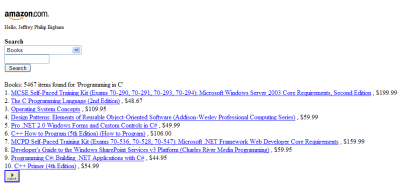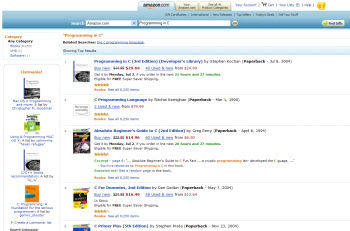In an informal meeting with one of our resident blind computer gurus, we were interested to learn that Amazon.com, the behemeth of online book sellers, offers a separate site called Amazon Access designed to be more accessible than the average amazon.com complexity soup. This was interesting, at least in part, because Amazon has become well-known in the accessibility community as the contractor responsible for target.com, a web page subject to an on-going lawsuit that may end up defining the responsibility of commercial web pages to make their content accessible.
A separate, accessible site sounds like a reasonable idea at first. Making the complex mess that is the current Amazon homepage accessible would be incredibly difficult, although one has to wonder if maybe that should tell them something about the quality of that design. A separate-but-equal approach can be acceptable (and even desirable) if the separate sites rely on the same underlying database, which would seem reasonable. As is so often the case with a separate-but-equal approach to accessibility, however, we recently found that Amazon Access is not equal to Amazon.com.
The screenshots below shows the search results for the phrase "Programming in C" on the two sites. Amazon returns the popular programming guide as its first result, whereas Amazon Access does not place this result in the top 10. Amazon Access lists the book, however, as we found when we searched for it by the author's last name instead. They're using a different (arguably inferior) search algorithm for the access site.
Perhaps worse is that the prices for the book on the two sites are different! As the screenshot above attests, it originally seems as though the price is more expensive by about $20. But, if you click through to actually purchase the book, you'll find that you can buy it for about $3 less on Amazon Access than on the regular Amazon page. Is this some sort of discount for accessibility users? No, turns out that the cheaper price is available through one of Amazon's partners, but the page for the book doesn't indicate this, making it seem as though the book is coming from Amazon.com. So what's wrong with that? For one, despite their accessibility failings, Amazon has a reputation for quality service and that's what I think I'm buying if I use Amazon Access. I don't expect to be subject to the service of whatever random fly-by-night shop that happened to partner with Amazon when I order from Amazon! More practically, Amazon offers great shipping prices, while their competitors usually don't. Super saver shipping is often free on Amazon.
Amazon Access seems like simply a misguided attempt to shoehorn Amazon's existing mobile web platform Amazon Anywhere into something that could fit accessibility needs. With different results, different prices and different companies, the sites can't really be said to offer the same content.
Check back here soon for a pointer to an Accessmonkey script that will fix some of the problems on the regular Amazon site.
A separate, accessible site sounds like a reasonable idea at first. Making the complex mess that is the current Amazon homepage accessible would be incredibly difficult, although one has to wonder if maybe that should tell them something about the quality of that design. A separate-but-equal approach can be acceptable (and even desirable) if the separate sites rely on the same underlying database, which would seem reasonable. As is so often the case with a separate-but-equal approach to accessibility, however, we recently found that Amazon Access is not equal to Amazon.com.
The screenshots below shows the search results for the phrase "Programming in C" on the two sites. Amazon returns the popular programming guide as its first result, whereas Amazon Access does not place this result in the top 10. Amazon Access lists the book, however, as we found when we searched for it by the author's last name instead. They're using a different (arguably inferior) search algorithm for the access site.
Perhaps worse is that the prices for the book on the two sites are different! As the screenshot above attests, it originally seems as though the price is more expensive by about $20. But, if you click through to actually purchase the book, you'll find that you can buy it for about $3 less on Amazon Access than on the regular Amazon page. Is this some sort of discount for accessibility users? No, turns out that the cheaper price is available through one of Amazon's partners, but the page for the book doesn't indicate this, making it seem as though the book is coming from Amazon.com. So what's wrong with that? For one, despite their accessibility failings, Amazon has a reputation for quality service and that's what I think I'm buying if I use Amazon Access. I don't expect to be subject to the service of whatever random fly-by-night shop that happened to partner with Amazon when I order from Amazon! More practically, Amazon offers great shipping prices, while their competitors usually don't. Super saver shipping is often free on Amazon.
Amazon Access seems like simply a misguided attempt to shoehorn Amazon's existing mobile web platform Amazon Anywhere into something that could fit accessibility needs. With different results, different prices and different companies, the sites can't really be said to offer the same content.
Check back here soon for a pointer to an Accessmonkey script that will fix some of the problems on the regular Amazon site.


